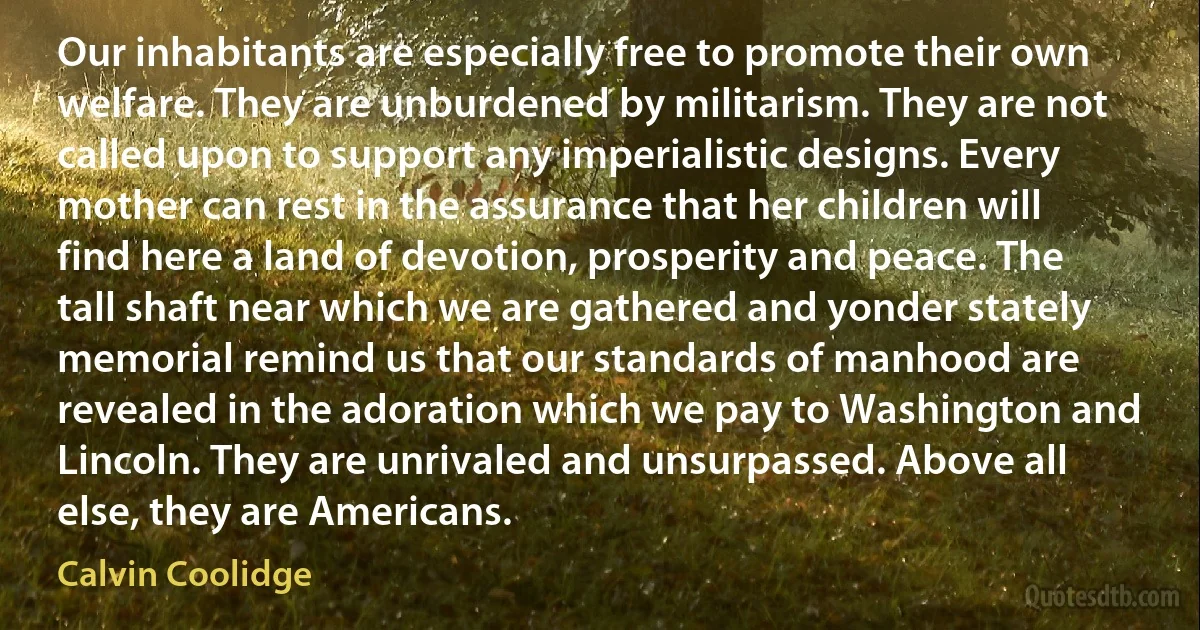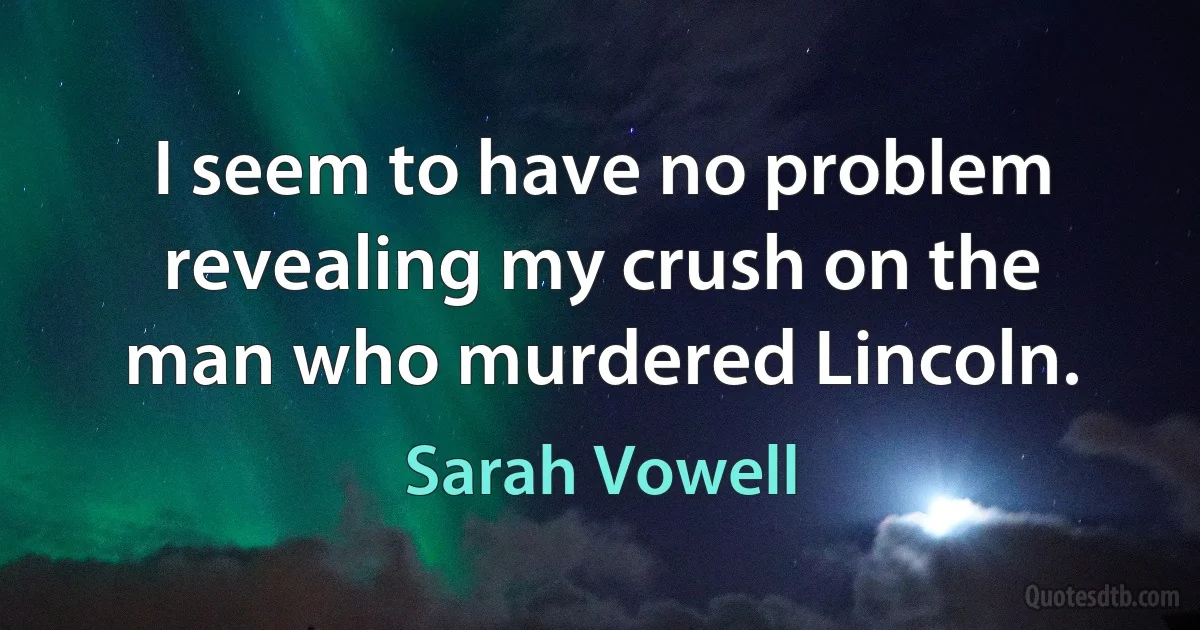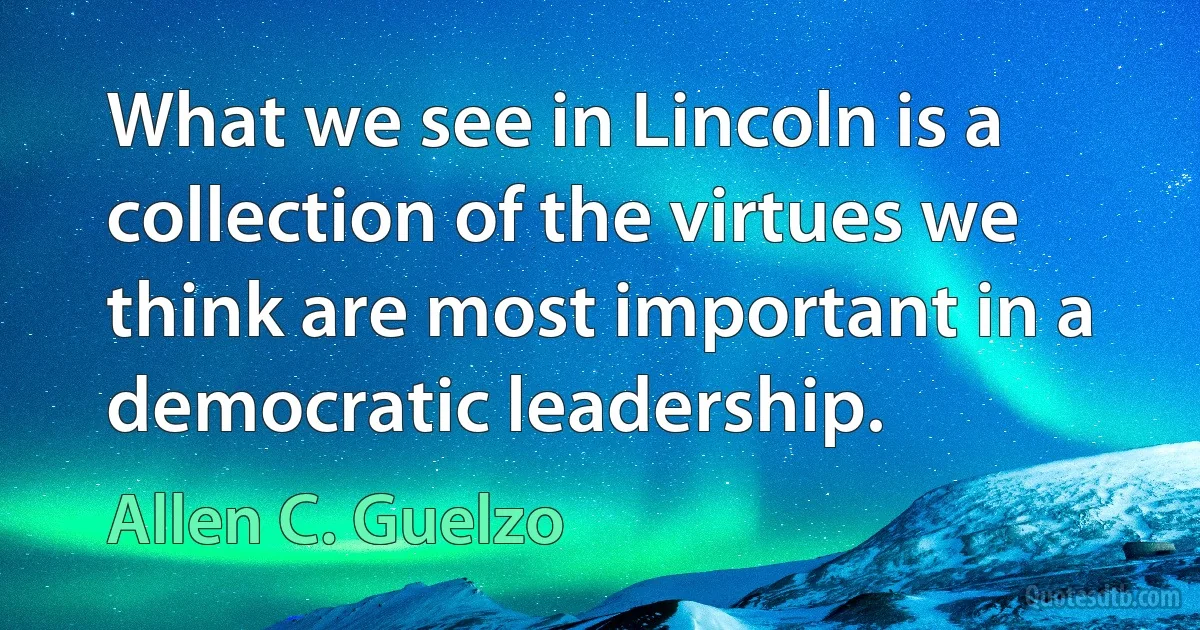Lincoln Quotes - page 11
I am a humanist because I think humanity can, with constant moral guidance, create reasonably decent societies. I think that young people who want to understand the world can profit from the works of Plato and Socrates, the behaviour of the three Thomases, Aquinas, More and Jefferson - the austere analyses of Immanuel Kant and the political leadership of Abraham Lincoln and Franklin Roosevelt.

James A. Michener
Who among American heroes could meet their tests, who would be cleared by their committees? Not Washington, who was a rebel. Not Jefferson, who wrote that all men are created equal and whose motto was "rebellion to tyrants is obedience to God." Not Garrison, who publicly burned the Constitution; or Wendell Phillips, who spoke for the underprivileged everywhere and counted himself a philosophical anarchist; not Seward of the Higher Law or Sumner of racial equality. Not Lincoln, who admonished us to have malice toward none, charity for all; or Wilson, who warned that our flag was "a flag of liberty of opinion as well as of political liberty"; or Justice Holmes, who said that our Constitution is an experiment and that while that experiment is being made "we should be eternally vigilant against attempts to check the expression of opinions that we loathe and believe to be fraught with death."

Henry Steele Commager
It is true that Mr. Lincoln signed the Emancipation Proclamation, after which there was a commitment to give 40 acres and a mule. That's where the argument, to this day, of reparations starts. We never got the 40 acres. We went all the way to Herbert Hoover, and we never got the 40 acres. We didn't get the mule. So we decided we'd ride this donkey as far as it would take us.

Al Sharpton
We have to do it for our children and for our grandchildren and so that this profound experiment in ordered liberty that was bequeathed to us by Madison and Washington and Hamilton and Adams and by Lincoln doesn't collapse. That republican government, which is ultimately what's at stake here, because a licentious people is not going to sustain republican government. We've got to make sure that republican government, government not only of the people as all government is but by and for the people doesn't perish from the Earth. If we lose it here, it's not as if it's going to be restarted somewhere else. People look to the United States to see if whether self-government can actually work and it's not going to work unless we as individual people and as members of small communities, institutions of civil society, are able to govern ourselves or are able to control our own passions and desires.

Robert P. George
People today often want to separate slavery, and say that Lincoln was interested in preserving the union and not in destroying slavery. No, that gets it exactly wrong. The two are as knotted together as a rope, because the only union worth preserving is a union that has abjured slavery. So for Lincoln to get rid of slavery is to purge America of the aristocratic poison. He once said that slavery was the one retrograde institution that was poisoning the American republic, keeping the American republic from realizing its full potential.

Allen C. Guelzo
Lincoln habitually would tell people he was totally ignorant of a subject which in fact he was quite well versed in, because then they would underestimate him, and when they underestimated him they would fall into his trap. Leonard Swett once said that anybody who mistook Lincoln for a simple man would soon end up with his back in a ditch.

Allen C. Guelzo
Lincoln sees American democracy as a last stand, what he calls the last, best hope. And if this goes down, we may so discredit the whole notion of democracy that no one will ever want to go this way again, and so this is the test. It's a test of whether or not we'll have this new birth of freedom, if we'll finally shuck off these last husks of aristocracy and move forward in the direction of democracy. That for him is the vital issue.

Allen C. Guelzo
Lincoln was not eloquent in the usual 19th century way, certainly not in the romantic way. He was not a man of frothing at the mouth or shaking his fist in a dramatic way. Lincoln was logic, and when he got the hook in your mouth he would pull you in no matter how much line was involved. One observer of the Lincoln-Douglas debates said that if you listened to Lincoln and Douglas for five minutes, you would go with Douglas. If you listened to them for an hour you always went with Lincoln.

Allen C. Guelzo
Lincoln is, both culturally and in terms of his economic thinking, firmly and immovably located in the center of what we can call liberal democratic thought in the 19th century. He is very much market oriented, with tremendous confidence in the power of a capitalist society to transform for the better, and he believes in opening the possibilities of that society to as many as possible. To him, that's what's coterminous with liberty.

Allen C. Guelzo
It was not Abraham Lincoln who invented the nanny-state; it was that son of the Confederacy, Woodrow Wilson. That American conservatives, even more than American leftists, should today manage to find themselves enamored of the secessionist republic may be the crowning irony of them all.

Allen C. Guelzo
[O]ne reason there is no socialism in America is because of Lincoln. In the American context Lincoln imparted to liberal democracy a sense of nobility and purpose that it has not always had in other contexts. He makes democracy something transcendent, and especially at Gettysburg where he talks about the nation having this new birth of freedom. He ratchets the horizons of liberal democracy right up past the spires of Cologne Cathedral and he makes it this glowing attractive ideal that people are willing to make these tremendous sacrifices to protect. Because at the end of the day this is what the Civil War is about-it's about the preservation of liberal democracy. In the 1860s the United States was the last Enlightenment experiment that was still standing. What you had in the climate of mid-19th century Europe was the renaissance of romantic aristocracy.

Allen C. Guelzo
Anyone who sits down for a moment to think about what the alternative would have looked like-a successful breakaway Confederacy-and how that would have flowed downstream has to be with impressed with what Lincoln was able to save us from. There is in the end no intrinsic reason why the Southern Confederacy should not have achieved its independence. And if they had, that would have had serious implications for the later role the North American continent plays in world affairs. Imagine a North American continent as divided politically and economically as South America. This would take the United States off the table as a major world player, and then what would you do with the history of the 20th century?

Allen C. Guelzo
To Lincoln, slavery undercut the free labor outlook on the world because it denied advancement and self-improvement. For Lincoln, the great attraction of any economic regime was the degree to which it permitted accumulation and self-promotion. He once described the ideal system as being one where the penniless beginner starts out working for somebody else, accumulates capital on his own by dint of savings, goes into business for himself, and then eventually becomes so successful that he hires others, who in turn continue the cycle. And he spoke of that as being the order of things in a society of equals. For him, the very notion of equality is a matter of equality of openness, aspiration, and opportunity.

Allen C. Guelzo



